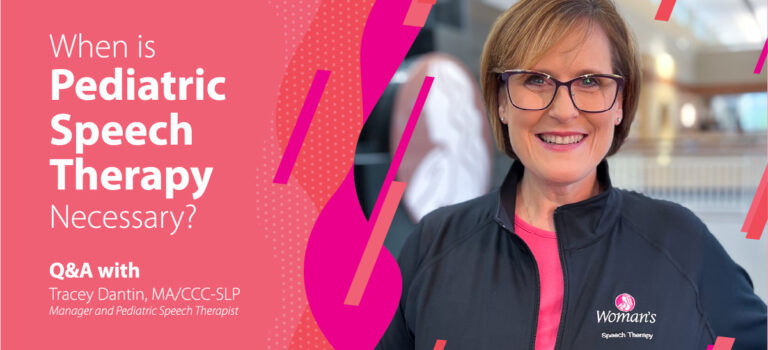Better Hearing and Speech Month is recognized in the month of May. According to the CDC, many individuals grow up living with unidentified hearing loss and never realize they are missing certain sounds and words. Children with hearing loss do not usually learn words as fast as children with normal hearing. Hearing sounds help children to learn how to speak and pronounce words.
Manager and Pediatric Speech Therapist Tracey Dantin, MA/CCC-SLP, shares some advice on recognizing the signs of hearing loss and stalled speech development, and the process of having your child tested in the frequently asked questions below:
Question: Around what age should you start considering speech therapy for your child?
Tracey’s Answer: Two and a half or three years of age is appropriate if you are concerned about articulation. If you have concerns about your child’s ability to comprehend and express him or herself, 18 months is a good age to begin. Additional concerns about an infant or toddler’s feeding issues should be brought to the attention of your child’s pediatrician to determine the appropriateness of patient referral.
Question: What are signs you should recognize when it’s time to consider having your child tested for speech therapy?
Tracey’s Answer: Speech development is more than just saying words – it includes engagement, interaction, comprehension and verbalization. Most infants and children develop back-and-forth communication skills by smiling or babbling in response to others and begin to recognize caregivers, notice objects in their environment and imitate vocalizations. In general, by 18 months, children should be able to say at least 10 words. By age two, a child should know about 50 words and should be able to follow simple commands, play appropriately with toys and point to photos or pbjects upon request. Around this time, you may even notice your child is producing short phrases.
Often, children meet their language milestones, but caregivers have difficulty understanding them. A general rule is that familiar listeners should be able to understand about 75% of their children’s speech by age three. If your child has not met those developmental milestones, you can ask your pediatrician for a referral.
Question: What is the process for being tested for speech therapy?
Tracey’s Answer: The process for being tested for speech therapy will vary based on the reasons for the child’s visit.
- First, speak with your child’s pediatrician to discuss your concerns. Your pediatrician may decide to start with a hearing assessment to ensure your child is hearing as they should be.
- During a speech therapy appointment, your child’s speech-language pathologist will ask many questions about how your child communicates at home, their development and what your main concerns are.
- The therapist will then determine an appropriate assessment and administer a test based on your concerns. This test can include assessing receptive language (comprehension) and expressive language (verbal language) skills and/or an assessment of your child’s articulation (pronunciation of sounds).
- Additional assessments can be administered by a speech-language pathologist such as feeding, oral motor skills, stuttering, and voice.
Question: What is the process for finding a speech therapist?
Tracey’s Answer: If you have concerns about your child’s speech and language development, please consult your pediatrician for recommendations. Woman’s has five speech-language pathologists who treat various pediatric speech-therapy disorders. Additionally, Woman’s has three full-time audiologists to assess your child’s hearing status.
To schedule an appointment with one of our speech-language pathologists or for additional information, visit our pediatric services therapy.

